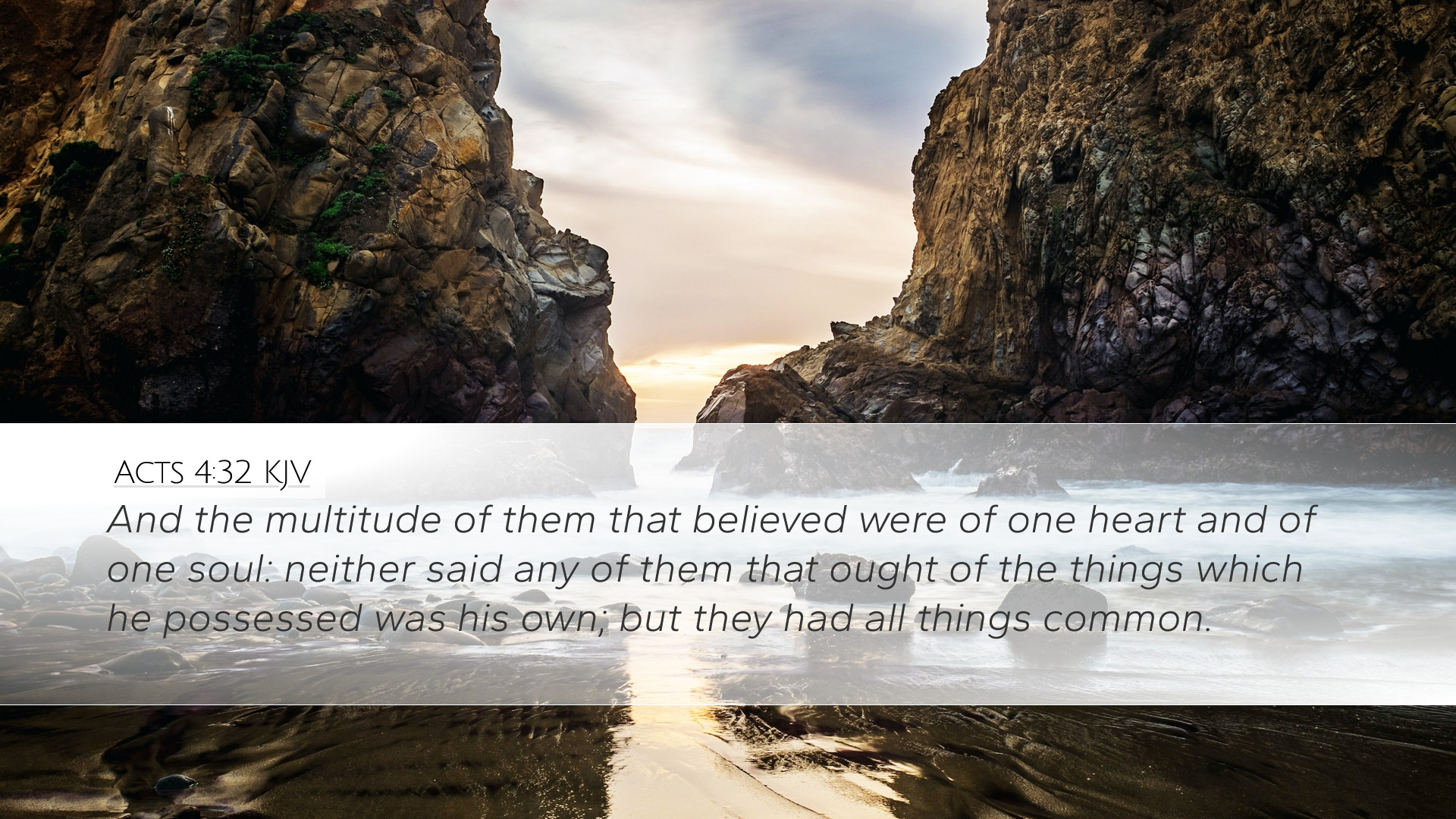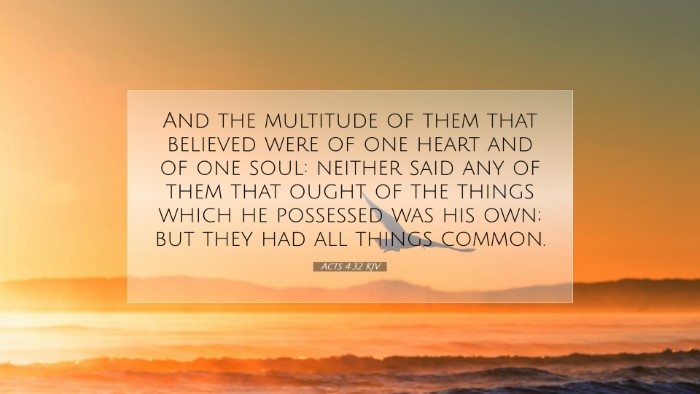Commentary on Acts 4:32
Verse: Acts 4:32 - "And the multitude of them that believed were of one heart and of one soul: neither said any of them that ought of the things which he possessed was his own; but they had all things common."
Introduction
This verse encapsulates a profound moment in the life of the early Church. The unity and community noted here among the believers exemplifies the transformative power of the Holy Spirit in their lives, as they collectively shared not only their faith but also their material possessions. Commentators such as Matthew Henry, Albert Barnes, and Adam Clarke provide valuable insights into this passage, illustrating its theological implications and practical applications.
Unity in Belief
One Heart and One Soul
Henry observes that the early Church experienced a remarkable spiritual unity. The phrase "one heart and one soul" suggests a deep-seated kinship among the believers. They were united not only in their faith in Christ but also in their zeal for the Gospel. This unity serves as a model for modern Christianity, prompting believers to seek common ground in their shared convictions and purpose.
Barnes highlights that their faith transcended mere agreement on doctrine; it fostered a bond that motivated collective action and support. This unity directed their attention away from self and towards the communal needs, demonstrating the impact of genuine faith in Christ.
Voluntary Community Sharing
Possessions Held in Common
This passage illustrates the principle of stewardship and selflessness. Adam Clarke notes that the early Christians did not view their possessions as something to be hoarded but as resources for the collective good. The statement "neither said any of them that ought of the things which he possessed was his own" emphasizes a profound paradigm shift in ownership. The believers recognized that their possessions were to be used for the benefit of the whole community.
Henry further elaborates that this attitude of relinquishing personal possessions in favor of communal needs counteracted selfish tendencies, thereby promoting harmony within the church. This represents not just a social economic practice but extends into the spiritual dimension of loving one's neighbor as oneself, fulfilling the moral teachings of Christ.
The Role of the Apostles
Testimony of the Resurrection
The subsequent verses highlight the role of the apostles in this communal environment. The apostles were proclaiming the resurrection of Jesus with great power. Barnes points out that this proclamation inspired confidence and conviction within the community, further strengthening their resolve to care for one another. As they experienced the power of the resurrection, believers were compelled to reflect that power in their actions toward each other.
Theological Implications
Community as a Reflection of Divine Nature
The community described in Acts serves as a living illustration of the Trinity—three persons in perfect unity. Clarke asserts that their oneness in heart and soul mirrors the divine relationship of love and mutual indwelling. Therefore, the Church is called to exemplify this divine unity in its community life.
Moreover, this unity is a reflection of the ethical teachings found throughout Scripture. Throughout the New Testament, believers are called to bear one another’s burdens (Galatians 6:2) and to act in love, which naturally leads to sharing and collaboration.
Challenges and Applications
Modern Implications of Acts 4:32
This early church model poses significant challenges to contemporary Christians. Using Henry's commentary, we see that the spirit of selflessness and unity is often compromised by individualism and materialism prevalent in today's society. Students and theologians alike are urged to examine their own communities and settings for significant barriers to such self-giving love.
Barnes emphasizes that the challenge lies in translating the principles of Acts 4 into practical manifestations today. Churches must foster environments where sharing and communal support flourish, understanding that the sense of personal ownership should be reframed within the context of collective purpose.
Conclusion
Acts 4:32 presents a profound vision for community life within the Church, where believers reflect the heart of Christ by embracing unity and shared purpose. Drawing from the insights of Henry, Barnes, and Clarke, it becomes evident that this passage is not mere historical account but is deeply relevant in guiding the conduct and fellowship of modern believers.
May the Church strive to embody the essence of Acts 4:32, living in unity, sharing in faith dynamically, and reflecting the love and generosity bestowed upon them by Christ.


